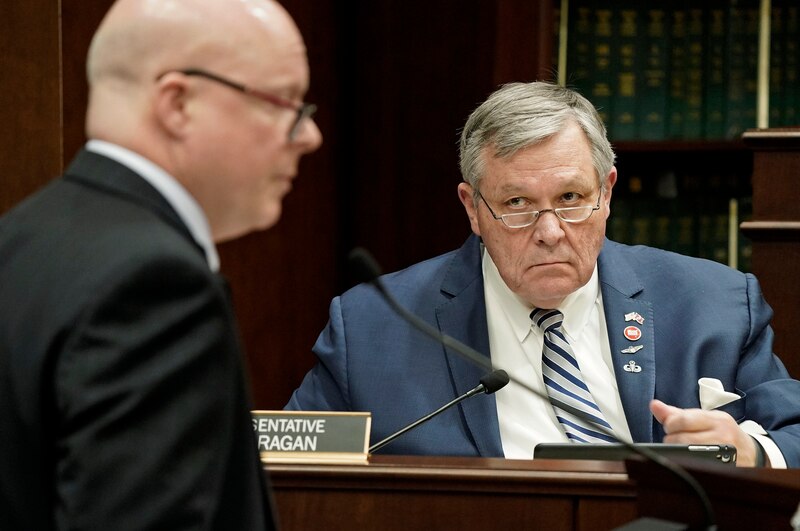Sign up for Chalkbeat Tennessee’s free daily newsletter to keep up with statewide education policy and Memphis-Shelby County Schools.
In many ways, Tennessee’s fiercest GOP legislative primary races amounted to a referendum on Gov. Bill Lee’s school voucher proposal to provide public funding to any K-12 student toward a private education.
On Thursday, Republican voters delivered the governor a mix of wins and losses on the issue.
And the wins likely were aided by a slew of negative campaign ads targeting anti-voucher candidates and funded by millions of dollars from out-of-state groups supporting the policy.
The money, along with the governor’s endorsements of pro-voucher candidates, appeared to have paid off in two out of three open House seats in Montgomery and Williamson counties. Only in Blount County, near Knoxville, did Lee’s pick lose as retired Maryville teacher and football coach Tom Stinnett defeated attorney Jason Emert.
Numerous legislative incumbents who were considered Lee’s key voucher allies also won their primaries, but there were two big exceptions.
Sen. Jon Lundberg, who sponsored the Senate’s version of a statewide voucher bill this year, was defeated by Bobby Harshbarger, a pharmacist who is the son of U.S. Rep. Diana Harshbarger of Tennessee. And John Ragan, an Oak Ridge Republican and voucher supporter, lost his primary contest to former Clinton Police Chief Rick Scarbrough.
The governor had actively stumped in Upper East Tennessee for Lundberg, who chairs the powerful Senate Education Committee. Lundberg’s voucher bill would have required recipients to take some type of national test to track the program’s academic outcomes. It also would have allowed public school students to enroll in any district, even if they’re not zoned for it, provided there’s enough space and teaching staff.
In addition, Lundberg co-chaired a task force last fall looking into the feasibility of Tennessee rejecting federal education funding. He and other Senate members ultimately issued a report highlighting the risks of such an unprecedented move, effectively shutting down the discussion this year.
Ragan, who served on the House Education Committee, is known for sponsoring socially conservative education legislation, including the 2019 law restricting what teachers can say about race, gender, and bias, as well as numerous anti-LGBTQ bills.

This week’s election results come after school choice groups spent at least $4.5 million on primary contests to promote pro-voucher candidates, according to a tally by The Tennessee Lookout. The governor, who has vowed to bring his voucher bill back to the legislature, said he was OK with that infusion of outside cash into Tennessee politics.
Most of the money came from the School Freedom Fund, a super PAC tied to Club for Growth funder and New York-based investment billionaire Jeff Yass. The same group spent $8.8 million this year in Texas to defeat 10 incumbent Republican candidates who opposed Gov. Greg Abbott’s voucher plan.
Among Tennessee lawmakers toppled with the aid of negative campaign ads was three-term Republican Sen. Frank Niceley, of Strawberry Plains, who opposed the governor’s voucher plan. Also defeated was state Rep. Bryan Richey, of Maryville, who voted against the bill in committee and was running for the Senate seat of retiring Sen. Art Swann.
On Friday, School Freedom Fund President David McIntosh trumpeted those defeats and the PAC’s $3.6 million investment in five legislative races.
“Make no mistake,” McIntosh said in a statement. “If you call yourself a Republican and oppose school freedom, you should expect to lose your next primary.”
The stage is now set for another round of campaigning, this time for the Nov. 5 general election against Democratic candidates who are unified in their opposition to vouchers but have struggled to be heard since the GOP gained a supermajority in the Tennessee General Assembly in 2010.
Half of the legislature’s Senate seats and all 99 in the House will be on the next ballot. While some won’t be contested, Democrats view vouchers as an opportunity to turn several seats.
And every vote matters in the tight battle over vouchers.
The governor’s universal voucher proposal was stymied in the legislature this year, even with a Republican supermajority and Lee making it his No. 1 legislative priority. An unlikely coalition of Democrats and rural Republicans kept the bill from reaching either floor for a vote.
Hoping to change the calculus when the newly elected legislature convenes in January, Lee took the unusual step this summer of endorsing Republican candidates who support vouchers over others who don’t.
Here’s are the outcomes in some of the mostly closely watched legislative primary races related to education:
Senate
- District 2: For the open seat vacated by Swann, Tom Hatcher, the Blount County court clerk, defeated Republican Rep. Richey.
- District 4: Lundberg, the Senate Education Committee chair, lost to Harshbarger, who was endorsed by former President Donald Trump. Harshbarger has expressed skepticism about Lee’s voucher plan.
- District 8: New Tazewell businessman Jessie Seal defeated the incumbent, Niceley, a voucher opponent. He will face Democrat R.E. Ellison.
- District 18: Incumbent Ferrell Haile, a Gallatin Republican who sits on the Senate Education Committee and serves as speaker pro tempore, easily defeated conservative activist Chris Spencer in another high-dollar Senate race. He will face Democrat Walter Chandler.
House of Representatives
- District 13: Republican incumbent Robert Stevens, of Smyrna, a member of the House Education Committee, defeated Murfreesboro City Council member Jami Averwater. He will face Democrat Jonathan Yancey.
- District 15: Democratic incumbent Sam McKenzie, who also serves on the education panel, defeated Knox County Commissioner Dasha Lundy. He will face Republican nominee Justin Hirst.
- District 20: In the open Blount County seat vacated by Richey, Stinnett, the retired teacher, defeated Jason Emert, former chair of the Young Republican National Federation, and Nick Bright, a cattle farmer. He will face Democrat Karen Gertz.
- District 24: Incumbent Kevin Raper, a retired educator from Cleveland, defeated Troy Weathers, a former Bradley County school board member. Both Republican candidates have spoken out against vouchers. Raper will face Democrat Andrea Chase.
- District 33: Ragan, the incumbent, lost to Scarborough, the former Clinton police chief. Scarbrough will face Democrat Anne Backus, a retired project manager at the Y-12 National Security Complex in Oak Ridge.
- District 60: In the open seat vacated by Democratic Rep. Darren Jernigan of Nashville, Democrat Shaundelle Brooks, who became a gun control activist after her son was killed in Nashville’s 2018 Waffle House shooting, defeated financial consultant Tyler Brasher. She will face pro-voucher Republican candidate Chad Bobo, who was endorsed by the governor and served as an aide to House Speaker Cameron Sexton. Bobo defeated Christopher Huff of Old Hickory.
- District 64: Incumbent Rep. Scott Cepicky, a Culleoka Republican and a lead sponsor of this year’s House voucher bill, defeated Maury County Commissioner Ray Jeter, despite calling the governor’s original statewide voucher bill “terrible” during a candidate forum a week before the election. He will face Democrat Eileen Longstreet.
- District 65: Candidate Lee Reeves, a real estate attorney and investor, narrowly defeated Williamson County Commissioner Brian Beathard, as well as Michelle Foreman, a former GOP state executive committee member. Reeves will face Democratic candidate LaRhonda Williams.
- District 68: Candidate Aron Maberry, a Clarksville pastor and school board member endorsed by Lee, defeated retired Army pilot Greg Gilman, Montgomery County Commissioner Joe Smith, and former county Republican Party co-chair Carol Duffin. Maberry will face Democrat Garfield Scott.
- District 73: Incumbent Rep. Chris Todd, of Humboldt, defeated former longtime Madison County Mayor Jimmy Harris, of Jackson. Todd was endorsed by the governor and favors vouchers, while Harris expressed concern about the policy’s financial impact on local public schools and also refused donations from special interest groups. There is no Democratic contender for the seat.
- District 77: Republican incumbent Rusty Grills, of Newbern, defeated Dyer County Commissioner Bubba Cobb, a retired educator who is against vouchers. There is no Democratic contender for the seat.
- District 83: Rep. Mark White, the longtime chairman of a House education committee, will face Democrat Noah Nordstrom, a teacher with Memphis-Shelby County Schools. Both ran unopposed in the primaries.
- District 96: In the open seat vacated by Democrat Dwayne Thompson, Democrat Gabby Salinas narrowly defeated Telisa Franklin and three other challengers. A researcher at St. Jude Children’s Research Hospital, Salinas faces no Republican opponent in November and will head to the statehouse in January.
- District 97: Incumbent Rep. John Gillespie, of Memphis, defeated Christina Oppenhuizen, a small-business owner. He’ll face Democrat Jesse Huseth in what’s expected to be a tight race.
Marta Aldrich is a senior correspondent and covers the statehouse for Chalkbeat Tennessee. Contact her at maldrich@chalkbeat.org.






